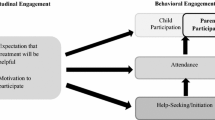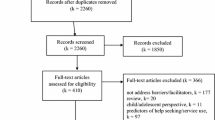Abstract
Objective
Parenting interventions have demonstrated some potential for effectiveness in improving psychosocial and health outcomes for children with type 1 diabetes (T1D) and their families. However, most interventions have been tested with parents of adolescents, and engagement of parents of younger children into parenting interventions remains problematic. This study aimed to assess the feasibility and acceptability of the Positive Parenting for Healthy Living program for parents of children with T1D.
Methods
We describe our experiences with engagement and recruitment of parents of 2- to 10-year-old children with T1D into a randomised controlled trial of a brief parenting intervention. Engagement, including rates of enrolment, assessment completion and session participation, as well as feasibility were assessed at multiple time points during the trial using multiple measures.
Results
We share our learnings in delivering and evaluating a parenting intervention for this population. In particular, we explore reasons for the low rate of enrolment, parents’ resistance in opening up about their problems, possible discrepancies between parent and practitioner views on the nature and extent of emotional and behavioural problems, and how better to target engagement efforts in the future.
Conclusions
We offer recommendations for engaging parents in future trials and parenting intervention initiatives.

Similar content being viewed by others
References
Asarnow, J. R., Rozenman, M., Wiblin, J., & Zeltzer, L. (2015). Integrated medical-behavioral care compared with usual primary care for child and adolescent behavioral health: a meta-analysisintegrated child/adolescent medical-behavioral primary careintegrated child/adolescent medical-behavioral primary care. JAMA Pediatrics, 169(10), 929–937.
Barakat, L. P., Patterson, C. A., Mondestin, V., Chavez, V., Austin, T., & Robinson, M. R., et al. (2013). Initial development of a questionnaire evaluating perceived benefits and barriers to pediatric clinical trials participation. Contemporary Clinical Trials, 34(2), 218–226.
Boogerd, E. A., Damhuis, A. M. A., van Alfen-van der Velden, J. A. E. M., Steeghs, M. C. C. H., Noordam, C., & Verhaak, C. M., et al. (2015). Assessment of psychosocial problems in children with type 1 diabetes and their families: the added value of using standardised questionnaires in addition to clinical estimations of nurses and paediatricians. Journal of Clinical Nursing, 24(15-16), 2143–2151.
Children’s Health Queensland Hospital and Health Service. (2018). Integrated care strategy. Brisbane, Australia: State of Queensland (Queensland Health).
Chisholm, V., Gonzalez, A., & Atkinson, L. (2014). Interpersonal engagement mediates the relation between maternal affect and externalising behaviour in young children with type 1 diabetes. PLoS ONE, 9(6), e97672.
Clarke, S. A., Calam, R., Morawska, A., & Sanders, M. (2014). Developing web-based Triple P ‘Positive Parenting Programme’ for families of children with asthma. Child, 40(4), 492–497.
Corralejo, S. M., & Domenech Rodríguez, M. M. (2018). Technology in parenting programs: a systematic review of existing interventions. Journal of Child and Family Studies, 27(9), 2717–2731.
Feldman, M. A., Anderson, L. M., Shapiro, J. B., Jedraszko, A. M., Evans, M., & Weil, L. E. G., et al. (2018). Family-based interventions targeting improvements in health and family outcomes of children and adolescents with type 1 diabetes: a systematic review. Current Diabetes Reports, 18(3), 15.
Fogel, N. R., & Weissberg-Benchell, J. (2010). Preventing poor psychological and health outcomes in pediatric type 1 diabetes. Current Diabetes Reports, 10(6), 436–443.
Gonzalez, C., Morawska, A., & Haslam, D. (2018). Enhancing initial parental engagement in interventions for parents of young children: a systematic review of experimental studies. Clinical Child and Family Psychology Review, 21(3), 415–432.
Greene, M. S., Mandleco, B., Roper, S. O., Marshall, E. S., & Dyches, T. (2010). Metabolic control, self-care behaviors, and parenting in adolescents with type 1 diabetes: a correlational study. The Diabetes Educator, 36(2), 326–336.
Gruhn, M. A., Lord, J. H., & Jaser, S. S. (2016). Collaborative and overinvolved parenting differentially predict outcomes in adolescents with type 1 diabetes. Health Psychology, 35(7), 652–660.
Herbert, L. J., Gillespie, C., Monaghan, M., Holmes, C., & Streisand, R. (2016). Factors associated with recruitment and retention in randomized controlled trials of behavioral interventions for patients with pediatric type 1 diabetes. Journal of Clinical Psychology in Medical Settings, 23(2), 112–125.
IDF. (2015). Diabetes atlas. 7th ed. Brussels, Belgium: International Diabetes Federation. http://www.diabetesatlas.org/resources/2015-atlas.html.
Kaminski, J. W., & Claussen, A. H. (2017). Evidence base update for psychosocial treatments for disruptive behaviors in children. Journal of Clinical Child & Adolescent Psychology, 46(4), 477–499.
Karlson, C. W., & Rapoff, M. A. (2009). Attrition in randomized controlled trials for pediatric chronic conditions. Journal of Pediatric Psychology, 34(7), 782–793.
Lohan, A., Mitchell, A., Filus, A., Sofronoff, K., & Morawska, A. (2016). Positive parenting for healthy living (Triple P) for parents of children with type 1 diabetes: protocol of a randomised controlled trial. BMC Pediatrics, 16(1), 158.
Lohan, A., Morawska, A., & Mitchell, A. (2015). A systematic review of parenting interventions for parents of children with type 1 diabetes. Child: Care, Health & Development, 41(6), 803–817.
Mackey, E. R., Herbert, L., Monaghan, M., Cogen, F., Wang, J., & Streisand, R. (2016). The feasibility of a pilot intervention for parents of young children newly diagnosed with type 1 diabetes. Clinical Practice in Pediatric Psychology, 4(1), 35–50.
Mazza, Vd. A., Lima, V. Fd, Carvalho, A. Kd. S., Weissheimer, G., & Soares, L. G. (2017). Online information as support to the families of children and adolescents with chronic disease. Revista Gaúcha de Enfermagem, 38, e63475.
McBroom, L. A., & Enriquez, M. (2009). Review of family-centered interventions to enhance the health outcomes of children with type 1 diabetes. The Diabetes Educator, 35(3), 428–438.
Mitchell, A., Morawska, A., & Grambower, J. (2019). Parents of children with type 1 diabetes: relationships between parental shame, autonomy support, and diabetes management. Manuscript in preparation.
Monaghan, M., Horn, I. B., Alvarez, V., Cogen, F. R., & Streisand, R. (2012). Authoritative parenting, parenting stress, and self-care in pre-adolescents with type 1 diabetes. Journal of Clinical Psychology in Medical Settings, 19(3), 255–261.
Morawska, A., Calam, R., & Fraser, J. (2015). Parenting interventions for childhood chronic illness: a review and recommendations for intervention design and delivery. Journal of Child Health Care, 19(1), 5–17.
Morawska, A., Mitchell, A., Burgess, S., & Fraser, J. (2016). Effects of triple P parenting intervention on child health outcomes for childhood asthma and eczema: randomised controlled trial. Behaviour Research and Therapy, 83, 35–44.
Morawska, A., Mitchell, A., Burgess, S., & Fraser, J. (2017). Fathers’ perceptions of change following parenting intervention: randomised controlled trial of triple P for parents of children with asthma or eczema. Journal of Pediatric Psychology, 42(7), 792–803.
Morawska, A., Mitchell, A., Burgess, S., & Fraser, J. (2017). Randomised controlled trial of triple P for parents of children with asthma or eczema: effects on parenting and child behaviour. Journal of Consulting and Clinical Psychology, 85(4), 283–296.
Morawska, A., & Sanders, M. R. (2011). Positive parenting for healthy living parent discussion group. Brisbane: Parenting and Family Support Centre, The University of Queensland.
Robinson, L., Adair, P., Coffey, M., Harris, R., & Burnside, G. (2016). Identifying the participant characteristics that predict recruitment and retention of participants to randomised controlled trials involving children: a systematic review. Trials, 17, 17.
Rose, M., Aronow, L., Breen, S., Tully, C., Hilliard, M. E., & Butler, A. M., et al. (2018). Considering culture: a review of pediatric behavioral intervention research in type diabetes. Current Diabetes Reports, 18(4), 10.
Sanders, M. R. (2012). Development, evaluation, and multinational dissemination of the triple P-positive parenting program. Annual Review of Clinical Psychology, 8, 345–379.
Sanders, M. R., Prinz, R., Sanders, M. R., & Mazzucchelli, T. G. (2018). Emergence of a population approach to evidence-based parenting support. The power of positive parenting: transforming the lives of children, parents and communities using the triple P system. New York, NY: Oxford University Press.
Sassmann, H., de Hair, M., Danne, T., & Lange, K. (2012). Reducing stress and supporting positive relations in families of young children with type 1 diabetes: a randomized controlled study for evaluating the effects of the DELFIN parenting program. BMC Pediatrics, 12(1), 152.
Taylor, S. E., Fredericks, E. M., Janisse, H. C., & Cousino, M. K. (2019). Systematic review of father involvement and child outcomes in pediatric chronic illness populations. Journal of Clinical Psychology in Medical Settings. https://doi.org/10.1007/s10880-019-09623-5.
Westrupp, E. M., Northam, E., Lee, K. J., Scratch, S. E., & Cameron, F. (2015). Reducing and preventing internalizing and externalizing behavior problems in children with type 1 diabetes: a randomized controlled trial of the triple P-positive parenting program. Pediatric Diabetes, 16(7), 554–563.
Whittemore, R., Jaser, S., Chao, A., Jang, M., & Grey, M. (2012). Psychological experience of parents of children with type 1 diabetes: a systematic mixed-studies review. The Diabetes Educator, 38(4), 562–579.
WHO. (2015). WHO global strategy on people-centred and integrated health services. Geneva, Switzerland: WHO. https://apps.who.int/iris/bitstream/handle/10665/155002/WHO_HIS_SDS_2015.6_eng.pdf;jsessionid=0217CB59F462003411DE55F8C67B7480?sequence=1.
Author Contributions
All authors contributed to study design. A.E.M. and A.L. implemented the study including participant recruitment and data collection. A.E.M. and A.M. conducted the analyses. All authors contributed to manuscript writing and revisions.
Funding
This work was supported by the Australian Research Council (grant number DP140100781) and a Children’s Hospital Foundation Early Career Fellowship (A.E.M.; award ref. 50223).
Author information
Authors and Affiliations
Corresponding author
Ethics declarations
Conflict of Interest
The Parenting and Family Support Centre is partly funded by royalties stemming from published resources of the Triple P—Positive Parenting Program, which is developed and owned by The University of Queensland (UQ). Royalties are also distributed to the Faculty of Health and Behavioural Sciences at UQ and contributory authors of published Triple P resources. Triple P International (TPI) Pty Ltd is a private company licensed by UQ, to publish and disseminate Triple P worldwide. The authors of this report have no share or ownership of TPI. A.M. has received royalties from TPI. TPI had no involvement in the study design, collection, analysis or interpretation of data, or writing of this report. A.M. and A.E.M. are employees at UQ.
Ethical Approval
Ethical approval was provided by the Queensland Children’s Hospital and Health Services District Human Research Ethics Committee (HREC/14/QRCH/1) and the University of Queensland Behavioural and Social Sciences Ethical Review Committee (2013001357).
Informed Consent
Informed consent was obtained from all individual participants included in the study.
Additional information
Publisher’s note Springer Nature remains neutral with regard to jurisdictional claims in published maps and institutional affiliations.
Rights and permissions
About this article
Cite this article
Morawska, A., Mitchell, A.E. & Lohan, A. Engaging Families of Children with Type 1 Diabetes into a Randomised Controlled Trial of a Brief Parenting Group Program. J Child Fam Stud 29, 1301–1311 (2020). https://doi.org/10.1007/s10826-019-01648-6
Published:
Issue Date:
DOI: https://doi.org/10.1007/s10826-019-01648-6




